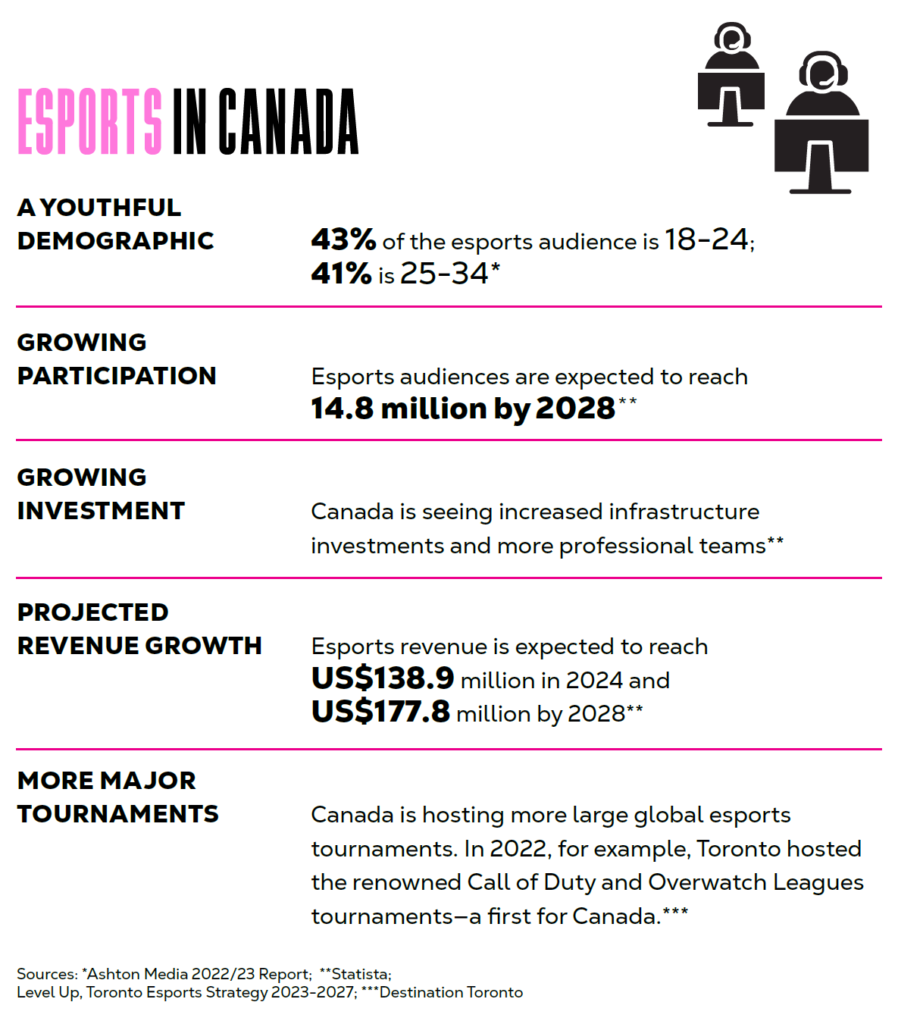Esport Trends to Watch
By Connie Jeskie Crane
The esports sector is robust. In 2022, Newzoo estimated total esports industry revenue had rocketed to US$1.38 billion and global audiences to around 532 million.
In Canada, aiming to attract major professionallevel gaming tournaments—not to mention youthful, spendy fans—destinations like Vancouver, Toronto and Waterloo, ON, are busy investing in infrastructure.
What does it all mean for the average sport organization? Fresh opportunities sure, but also a shifting landscape. We asked Laurel Walzak, associate professor, sport media, at Toronto Metropolitan University, what’s changing about esports and how sport bodies can get in on the action.
A BROAD DEMOGRAPHIC
First off, esports offers sport organizations new potential followers. Compared to traditional sports, the ecosystem is younger with growth focused in the 16-to-35 age demographic, Walzak says.
Gender-wise, while there’s a gap, Walzak says female representation is growing. Few esports pro players are female. Yet according to Newzoo figures, women make up about 34% of esports audiences globally and 46% of the general gaming population. Walzak says with more women in leadership roles at esports organizations, female participants are feeling more acceptance. “There were a lot of toxic behaviours in gaming and esports towards women. But that is starting to be called out.”
Here’s another interesting opportunity. Esports can potentially attract an untapped demographic, what Walzak calls “pure gamers”— essentially, followers who only engage with esports components (not live sports). Savvy sport organizations, she says, are recognizing this subset as a new revenue stream with growth potential.
OLYMPIC-SIZED INVESTMENTS
Esports is becoming hard for sport organizations to ignore. The latest buzzworthy development is International Olympic Committee (IOC) involvement. “The IOC just announced their 12-year deal with the National Olympic Committee in Saudi Arabia,” Walzak says. In a bid to retain younger audiences, the oil-rich nation will host the first-ever Olympic Esports Games in 2025.
Walzak also points to further massive investments, like “outrageous” prize pools. The largest to date, for example, was an eye-watering US$60 million at the 2024 Esports World Cup in Riyadh, Saudi Arabia this past summer.
A MORE REGULATED SECTOR
Once a “Wild West,” Walzak says with esports communities becoming bigger and “the IOC now involved…this is going to add more rules and regulations.”
HOW TO GET INVOLVED
Walzak advises sport organizations to:
Do your research and develop objectives: There are free resources, leagues, sport organizations and academic resources available. “Really understand, ‘What is it that esports can do for your business?’”
Understand your audience: “What is your audience and what is it you are trying to offer and propose to the audience?” Without that legwork, she says, “It’s going to be difficult to commercialize it.”
Understand the investment: Assess your tech platform and determine what you’re going to be spending overall on esports and use that to determine business goals.
Legalities: Among many details, organizers need permission to use copyrighted games at public events, and, “You are going to be doing contracts and negotiations with sponsors, or contract negotiations with gamers.”

Published October 2024




